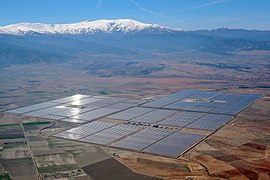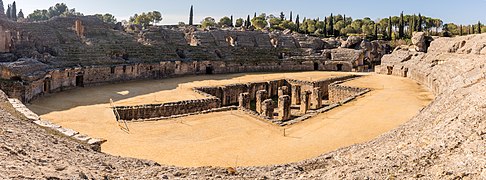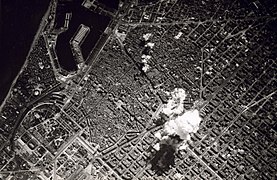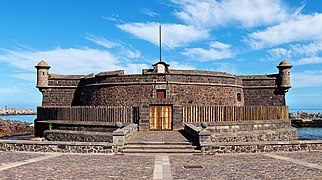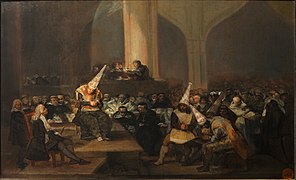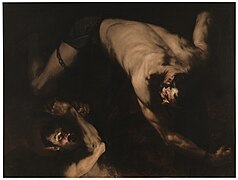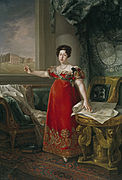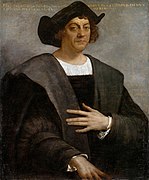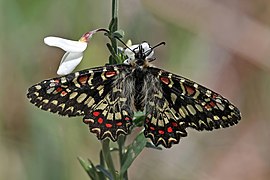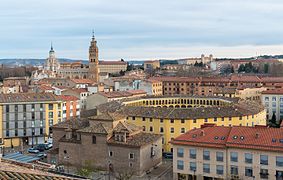Portal:Spain
THE SPAIN PORTAL
EL PORTAL DE ESPAÑA

|

|

| |
Spain (Spanish: España), officially the Kingdom of Spain (Reino de España), is a country in southern Europe. It is located on the Iberian Peninsula in southwestern Europe. The country consists of Peninsular Spain which is located between the Mediterranean Sea and the Atlantic Ocean, two archipelagos, one in each sea, and two autonomous cities in North Africa. The mainland area of Spain is bordered by the Mediterranean Sea to the southern and eastern areas, the Cantabric Sea to the north and the Atlantic Ocean to the west. Spain is organised as a parliamentary democracy and is a constitutional monarchy. Spain has been a member of the European Union since 1986 and is a developed country, with the ninth largest economy in the world and fifth largest in the EU. With an area of 504,030 km², Spain is the second largest country in Western Europe (behind France).
Spain flourished under the Roman empire Hispania, thus becoming one of the Empire's most important regions at the time. During the times of the Middle Ages, Spain was under Germanic rule, only later to come under the rule of the Islamic caliphate. Spain emerged as a unified country in the 15th century, following the completion of the reconquest of the Iberian peninsula in 1492. It has been an important source of influence to other regions, chiefly during the Modern Era, when it became a global empire that has left a legacy of over 500 million Spanish speakers today, making it the world's second most spoken first language.
Selected article
There have been tanks in the Spanish Army since French FT-17s were delivered in 1919. These were used in the Rif War and participated in the first amphibious landing with tanks. In 1925, the Spanish Army began to produce its own tank, based on the FT-17, but it was never put into mass production. During the Spanish Civil War, the two opposing armies received many tanks from foreign powers. The war proved inconclusive in regards to the proof of mechanized warfare, despite attempts by foreign advisers and soldiers to use newly devised theories. Afterwards, Spain began to manufacture a light tank, known as the Verdeja, but the project was a failure. In 1953, the United States agreed to supply tanks including the M48 Patton (pictured) but after a dispute about the tanks' use Spain began to look elsewhere for further tanks, including the AMX-30E. Renewed plans for a Spanish tank (the Lince program) failed due to financial problems; instead Spain modernized the AMX-30Es and procured American M60 Patton tanks. In 1994, Spain began negotiating with Germany to purchase the Leopard 2, procuring 108 Leopard 2A4s and building 219 Leopard 2Es in Spain; these are still in use.
Selected picture

In the news
Selected biography

Pedro Almodóvar Caballero (Spanish pronunciation: [ˈpeð̞ɾo almoˈð̞oβ̞aɾ kaβ̞aˈʝeɾo]) (born September 24, 1949 in Calzada de Calatrava, Spain) is a Spanish film director, screenwriter and producer. Almodóvar is the most successful and internationally known Spanish filmmaker of his generation. His films, marked by complex narratives, employ the codes of melodrama and use elements of pop culture, popular songs, irreverent humor, strong colors and glossy décor. He never judges his character's actions, whatever they do, but he presents them as they are in all their complexity. Desire, passion, family and identity are the director's favorite themes. Almodóvar’s films enjoy a worldwide following and he has become a major figure on the stage of world cinema.
Pedro Almodóvar Caballero was born on September 24, 1949 in Calzada de Calatrava, a rural small town of Ciudad Real, a province of Castile-La Mancha in the administrative district of Almagro. La Mancha is the windswept region of flat lands made famous by Don Quijote. He was born as one of four children (two boys, two girls) in a large and impoverished family of peasant stock. His father, Antonio Almodóvar, who could barely read or write worked most of his life hauling barrels of wine by mule. Almodóvar's mother, Francisca Caballero, turned her son into a part time teacher of literacy in the village and also a letter reader and transcriber for the neighbors. When Pedro was eight years old, the family sent him to study at a religious boarding school in the city of Cáceres, Extremadura, in the west of the country, with the hope that he might someday become a priest.
Did you know?

- ...that Spain became a member of the European Union in 1986?
- ...that the Kingdoms of Portugal and Spain were once united in the 16th century?
- ...that the Spanish Canary Islands are an outermost region of the EU?
Selected quote
| “ | When you want to make it clear to the rest of the world that you are not an imperialist, the best countries to have with you are Britain and Spain. | ” |
Featured content
| This is a list of recognized content, updated weekly by JL-Bot (talk · contribs) (typically on Saturdays). There is no need to edit the list yourself. If an article is missing from the list, make sure it is tagged (e.g. {{WikiProject Spain}}) or categorized correctly and wait for the next update. See WP:RECOG for configuration options. |
Featured articles
- AMX-30E
- Spanish battleship Alfonso XIII
- Andalusian horse
- Battle of Barrosa
- Battle of Halmyros
- Battle of Bicocca
- Black stork
- Boletus aereus
- The Colossus of Rhodes (Dalí)
- The Disasters of War
- First Punic War
- The Garden of Earthly Delights
- Battle of the Gebora
- El Greco
- History of Gibraltar
- Ismail I of Granada
- Italian War of 1521–1526
- Italian War of 1542–1546
- War of the League of Cambrai
- Leopard 2E
- Hurricane Leslie (2018)
- Lince (tank)
- Joseph A. Lopez
- Las Meninas
- Mercenary War
- Muhammad I of Granada
- Muhammad II of Granada
- Muhammad III of Granada
- Muhammad IV of Granada
- Nasr of Granada
- Battle of New Carthage
- Nyon Conference
- Oran fatwa
- Panzer I
- Rokeby Venus
- Santa María de Óvila
- Second Punic War
- Spanish conquest of Guatemala
- Spanish conquest of Petén
- Tanks in the Spanish Army
- The Third of May 1808
- Verdeja
- 2015 Vuelta a España
- Witches' Sabbath (The Great He-Goat)
- Yusuf I of Granada
Featured lists
- Javier Bardem filmography
- List of international goals scored by Alfredo Di Stéfano
- List of FC Barcelona presidents
- List of FC Barcelona seasons
- List of Real Madrid CF seasons
- List of Spanish football champions
- List of World Heritage Sites in Spain
- List of international goals scored by David Villa
- List of sieges of Gibraltar
- List of teams and cyclists in the 2015 Vuelta a España
- List of international goals scored by Fernando Torres
Good articles
- 4F case
- 1933 Spanish general election
- 1936 Spanish general election
- 1986 enlargement of the European Communities
- 1987 vote of no confidence in the government of Felipe González
- 1997 European Grand Prix
- 2000 Spanish Grand Prix
- 2008 Spanish Grand Prix
- 2010 European Grand Prix
- 2010 FIFA World Cup final
- 2012 Spanish Grand Prix
- 2014 Spanish Grand Prix
- 2015–2016 Spanish government formation
- 2015 Clásica de San Sebastián
- 2015 Spanish Grand Prix
- 2015 Vuelta a España, Stage 1 to Stage 11
- 2015 Vuelta a España, Stage 12 to Stage 21
- 2016 Spanish Grand Prix
- 2016 Tour of the Basque Country
- 2016 Volta a Catalunya
- 2017 vote of no confidence in the government of Mariano Rajoy
- 2018 vote of no confidence in the government of Mariano Rajoy
- 2019–2020 Spanish government formation
- Abd al-Malik ibn Umar ibn Marwan
- Abu Said Faraj
- Action of 15 July 1798
- Action of 16 October 1799
- Action of 26 April 1797
- Agua Dulce, Agua Salá
- David Alcaide
- Alconétar Bridge
- Algeciras campaign
- First Battle of Algeciras
- Xabi Alonso
- Alsedo-class destroyer
- Gómez de Alvarado
- Amiga Mía
- Trinidad Arroyo
- Joaquín Ascaso
- Así Fue
- 1977 Atocha massacre
- Averroes
- Ay mamá
- Abel Azcona
- Background of the Spanish Civil War
- Badajoz
- Battle of Noordhorn
- Battle of Winchelsea
- Battle of Zutphen
- Berengaria of Castile
- Luis Buñuel
- Burgos trials
- Cagot
- Battle of Cape St. Vincent (1780)
- Battle of Cape St. Vincent (1606)
- Battle of Cartagena de Indias
- Bartolomé de las Casas
- 2017 Catalan general strike
- El Celler de Can Roca
- Charlemagne
- Ciutat Morta
- Coat of arms of Basque Country (autonomous community)
- José Cobo Cano
- 1918 Copa del Rey final
- Diego Costa
- Cross of Saint James
- Penélope Cruz
- Cumbre Vieja tsunami hazard
- Luis Daoíz y Torres
- Léon Degrelle
- Álvaro Domínguez (footballer, born 1989)
- Dutch expedition to Valdivia
- Enamorado Por Primera Vez
- Erromintxela language
- Marina de Escobar
- Spanish battleship España
- Esperanza (Enrique Iglesias song)
- European debt crisis
- 2011 Euskaltel–Euskadi season
- Fatima bint al-Ahmar
- Flavius Paulus
- Forced conversions of Muslims in Spain
- Nahikari García
- Pau Gasol
- German involvement in the Spanish Civil War
- Germanwings Flight 9525
- Twelfth siege of Gibraltar
- Mauricio González-Gordon y Díez
- Grey heron
- Guanche mummies
- Pep Guardiola
- Hadrian
- The House of Flowers (TV series)
- Hypericum grandifolium
- Pablo Ibáñez
- Ramón Iribarren
- Spanish battleship Jaime I
- Jesé
- Jiloca (river)
- Jonah ibn Janah
- William B. Jordan
- La Masia
- Eugenio Lascorz
- Last use of capital punishment in Spain
- 1957 Latin Cup
- Battle of the Lippe
- List of battleships of Spain
- Juan López Mella
- Paco de Lucía
- Mad Dogs (British TV series)
- Raid on Manila
- Mary I of England
- Teresa Mañé
- Richard Worsam Meade I
- Mediterranean campaign of 1798
- Miente
- Monbar Hotel attack
- Money Heist
- Moorish Gibraltar
- Morral affair
- Mudéjar revolt of 1264–1266
- Muhammad VII of Granada
- Non-intervention in the Spanish Civil War
- North Korean Embassy in Madrid incident
- Nunca Te Olvidaré
- Obras Son Amores
- Battle of Ollantaytambo
- Onneca Fortúnez
- Battle of Orbetello
- Ottoman–Venetian War (1570–1573)
- María Pacheco
- 2009 Palma Nova bombing
- Philip III of Navarre
- Philippines
- Pi de les Tres Branques
- Pic-Nic
- Pikes Hotel
- Punic Wars
- Real Madrid CF
- Reina Victoria Eugenia-class battleship
- Revolt of the Comuneros
- Rhythm Divine
- Battle of Roatán
- Siege of the Salamanca forts
- Sandugo
- Alejandro Sanz
- Shambhala (roller coaster)
- Si Tú Te Vas (Enrique Iglesias song)
- Siege of Castelnuovo
- Siege of Almería (1309)
- Spain in Our Hearts
- Spain in the Eurovision Song Contest 2013
- Spanish American wars of independence
- Spanish Texas
- Spanish conquest of Chiapas
- Spanish conquest of El Salvador
- Spanish conquest of Honduras
- Spanish conquest of the Maya
- Spanish coup of July 1936
- Clara Stauffer
- Supporters of FC Barcelona
- Te Lo Agradezco, Pero No
- Clara Thalmann
- The House of Flowers season 2
- Fernando Torres
- Manuel Torres (diplomat)
- La Tortura
- Trajan
- Tristan and Isolde (Egusquiza)
- Valencia (Congress of Deputies constituency)
- David Villa
- Tomás Yepes
- Yusuf II of Granada
- Plácido Zuloaga
- Subtropical Storm Alpha (2020)
Did you know? articles
- 1428 Catalonia earthquake
- 1492 light sighting
- 1826 Canary Islands storm
- 1833 territorial division of Spain
- 1936 Spanish general election
- 1973 P.F. Barcelona season
- 1978 Spanish trade union representative elections
- 1986 enlargement of the European Communities
- 2012 Spanish Grand Prix
- 2015 La Madrid Challenge by La Vuelta
- 2015 Spanish Grand Prix
- 2022 European Cricket League
- A Barca
- AMX-30E
- Abada (rhinoceros)
- Abadiño
- Abbasid–Carolingian alliance
- Abd al-Malik ibn Umar ibn Marwan
- Abu Said Faraj
- Todros ben Judah Halevi Abulafia
- Accidentalism and catastrophism
- Action of 16 October 1799
- Action of 26 April 1797
- The Actor (painting)
- Rosario de Acuña
- Adalid
- Bernardo Adam Ferrero
- Pedro de Aguado
- Sixto Agudo
- Natacha Aguilar de Soto
- Ajacán Mission
- Alavaraphidia
- Alba Bible
- José Albi
- Núria Albó
- Alcabala
- David Alcaide
- Alcanar
- Alcazaba of Málaga
- Alcázar de los Reyes Cristianos
- Aldeadávila Dam
- Alex, Jorge y Lena
- Alférez
- Pedro Alfonso
- Algiers expedition (1541)
- Monument to Woody Allen
- Omar Allibhoy
- Almazán
- Almendralejo
- Rebellion of the Alpujarras (1499–1501)
- Alt Camp
- Amarantoraphidia
- Saint Amaro
- Juan de Amézqueta
- Amorebieta-Etxano
- Georgina Amorós
- Ancient synagogue (Barcelona)
- Andalusia
- Ruth Matilda Anderson
- Rogelio Bernal Andreo
- Aneto
- Pedro Aparicio (politician)
- Aquis Querquennis
- Archbishop's Palace, Seville
- Diego de Argumosa
- Francisco Aritmendi
- Army of Flanders
- Arnau Mir de Tost
- Juan de Arphe y Villafañe
- Arrano beltza
- Las arras
- Trinidad Arroyo
- Arsenal de La Carraca
- Ignacio de Arteaga y Bazán
- Joan Gardy Artigas
- Elena Arzak
- Así Fue
- Asociación Obrera Asambleista
- Pedro de Atarés
- Athletic Bilbao signing policy
- Auditorio Monte do Gozo
- Averroes
- Avinguda Diagonal
- Ay mamá
- Abel Azcona
- Félix Aznar
- Capture of Bacharach
- Background of the Spanish Civil War
- Badajoz
- University of Baeza
- Bajo de la Campana Phoenician shipwreck
- Carmen Balcells
- Spanish cruiser Baleares
- Bandido (Azúcar Moreno song)
- Barcelona Series
- Javier Bardem filmography
- Belén Barenys
- Basilica of Begoña
- Basque witch trials
- Battle of Halmyros
- Battle of Matasiete
- Battle of Salé
- Bayonne Statute
- Silvia Bellot
- Bendinat
- Martín Berasategui
- Berengaria of Castile
- Berenguela Tower
- Berenguier de Palazol
- Beth Yaacov Synagogue (Madrid)
- Alemayehu Bezabeh
- Bienmesabe
- Joaquín Bilbao
- The Black Duchess
- Black Swan Project
- Black stork
- Rebecca Blake
- Hortensia Blanch Pita
- Andrés Boira
- Bombus cerdanyensis
- Hogueras de Alicante
- Francisco de Borja
- Bosnia and Herzegovina–Spain relations
- Flora Botton
- Princess María Teresa of Bourbon-Parma
- Juan Bravo Murillo
- Luis Bravo de Acuña
- Manuel Broseta
- Palacio de Buenavista
- Omar Bundy
- Carmen de Burgos
- Burgos trials
- El Buscón
- Bust of Abd al-Rahman III, Cadrete
- C-9 (Cercanías Madrid)
- C-13 highway (Spain)
- Cabo de Gata-Níjar Natural Park
- Dolores Cabrera y Heredia
- Arnau Cadell
- Caganer
- Battle of Cajamarca
- Cala Arenas
- Callao affair
- Giovanni Battista Calvi
- Baltasar Calvo
- Clara Campoamor
- Cantabroraphidia
- Ramon Vila Capdevila
- Capitulations of Santa Fe
- Capture of Peñón of Algiers (1529)
- Capture of the sloop Anne
- Juan José Carbó
- The Caress of a Bird
- Nathalie Carpanedo
- Raymond Carr
- Avelina Carrera
- Carteia
- Luis de Carvajal the Younger
- Casa Anchieta
- Casa Fuerte de Adeje
- Casco de Leiro
- Esperanza Casteleiro
- Castelldefels Castle
- Castilian Civil War
- Castillo de Coca
- Castillo de Santa Catalina (La Palma)
- Castle of Zafra (Guadalajara)
- Catalan Civil War
- Catalan Talgo
- Catalan wine
- Cathedral-Basilica of Our Lady of the Pillar
- El Celler de Can Roca
- Julio Cervera Baviera
- Charlemagne
- Charles III of Navarre
- Charles V Wall
- Chiclana de la Frontera
- Chicuelo (guitarist)
- Province of Ciudad Real
- Coat of arms of Asturias
- Coat of arms of Basque Country (autonomous community)
- Coat of arms of Santiago de Compostela
- José Cobo Cano
- Codex Calixtinus
- Judith R. Cohen
- Anna Cohí
- Lluís Coll
- Collegio di Spagna
- Maria Josep Colomer i Luque
- The Colossus of Rhodes (Dalí)
- Columbus Monument, Barcelona
- Columbus's vow
- Comillas
- Communist Party of Andalusia
- Conca de Barberà
- Confederación Xeral de Traballadores Galegos-Intersindical Nacional
- Confederación de Sindicatos Unitarios de Trabajadores
- Conill (Tàrrega)
- Conquest of Tunis (1574)
- Conquest of Murcia (1265–1266)
- Constitutional Court of Spain
- Convent of Santo Domingo (Valencia)
- Convention of London (1786)
- Convention of London (1861)
- Matthew Cook (rugby union)
- Alberto Corazón
- Miguel Ángel Coria
- Corral de comedias
- Corral de comedias de Almagro
- Corta Atalaya
- Corts Valencianes
- Diego Costa
- Costumbrismo
- County of Besalú
- Cova Foradà
- Salvador Cristau Coll
- Croscat
- Cross of Saint James
- José Cruz Herrera
- Sílvia Pérez Cruz
- Irene Cuesta
- Cueva de Bolomor
- Carlos Cuevas
- Cumbre Vieja tsunami hazard
- 2021 Cumbre Vieja volcanic eruption
- Cursa de Bombers
- Dalí Atomicus
- Luis Daoíz y Torres
- Enrique Dávila Pacheco
- Deprisa, deprisa
- Descubierta and Atrevida
- List of international goals scored by Alfredo Di Stéfano
- Fruela Díaz
- José and Francisco Díaz
- Dictatorship of Primo de Rivera
- Dioscorea chouardii
- Luc André Diouf
- Disabled sports in Spain
- The Disasters of War
- Distracted boyfriend
- Dolmen de Soto
- Álvaro Domínguez (footballer, born 1989)
- Dominic de la Calzada
- Dominio de Pingus
- Don Juan Mateos
- Don Vincente
- Dona i Ocell
- Dragos Gemelos
- Dudum siquidem
- Duke of Veragua
- Spanish ironclad Duque de Tetuán
- Dutch expedition to Valdivia
- The Ecumenical Council (painting)
- El Drago Milenario
- Elevador de Aguas de Gordejuela
- María Luisa Elío
- Elizalde (automobile)
- Emblem of Andalusia
- L'Encobert
- Engaña Tunnel
- Beatriz Enríquez de Arana
- Ermua
- Bernardino de Escalante
- Marina de Escobar
- Óscar Espallargas
- Euskadi Roja
- Eusko Langillen Alkartasuna (Askatuta) – Solidaridad de Trabajadores Vascos (Independiente)
- Events of 6 October
- Expedition to Mostaganem (1558)
- Exposición Nacional de Minería (1883)
- FC Barcelona Museum
- Falklands Crisis of 1770
- Maruxa and Coralia Fandiño Ricart
- Fatima bint al-Ahmar
- Feast of Saint James
- Femme au béret et à la robe quadrillée (Marie-Thérèse Walter)
- Martina Fernández (footballer)
- Fernando Ansúrez II
- Arnau Ferrer
- Maria Teresa Ferrer i Mallol
- Fifth siege of Gibraltar
- First Biennium
- First siege of Gibraltar
- Flora and Maria
- Hotel Florida (Madrid)
- El Fonoll
- Fontanilla
- Joan Fontcuberta
- Footpaths of Gibraltar
- Forced conversions of Muslims in Spain
- Eva Forest
- Fort Guijarros
- Fountain of the Pear Tree Canals
- Fourth siege of Gibraltar
- Statue of Francisco Franco, Melilla
- Giovan Giacomo Paleari Fratino
- Fuerte de Isla Verde
- Marina de Gabaráin
- Galatea of the Spheres
- Mar Galcerán
- Galcerán Bridge
- Miguel Galindo Garcés
- Ramiro Garcés, Lord of Calahorra
- Carme García
- Diego García de Moguer
- Nahikari García
- Ignacio Garriga
- Battle of the Gebora
- General Archive of the Indies
- Tino di Geraldo
- German involvement in the Spanish Civil War
- 2008 Getxo bombing
- Twelfth siege of Gibraltar
- Thirteenth siege of Gibraltar
- Teresa Gil de Vidaure
- Ginés de la Jara
- Alicia Girón García
- Igor González de Galdeano
- Mauricio González-Gordon y Díez
- Vicente González Lizondo
- Pedro Javier González
- Gabriel Gorce
- Valencian Terrier
- Grabaciones Accidentales
- Grey heron
- Diego de Guevara
- Guimerà
- Carlos de Haes
- Charles Frederick Henningsen
- Hermandad Lírica
- Hermitage of El Rocío
- Carla Herrero
- High Court of Justice of Andalusia, Ceuta and Melilla
- Hipercor bombing
- History of chocolate in Spain
- Holy Door (Santiago de Compostela)
- Ramón Homs
- The House of Flowers (TV series)
- Dean Huijsen
- Al-Hurr ibn Abd al-Rahman al-Thaqafi
- Hypericum grandifolium
- Iberian Pyrite Belt
- Iberian orca attacks
- Iberian ribbed newt
- Iberian rock lizard
- Iberoraphidia
- Church of Nuestra Señora de la Palma, Algeciras
- Ildefonsus
- The Immaculate Conception of Los Venerables
- HMS Imperieuse (1805)
- International Sociological Association
- María Soledad Iparraguirre
- Antonio Iranzo
- Ramón Iribarren
- Manuel de Irujo
- William Isarn
- Ismail I of Granada
- 1980 Ispaster attack
- Italian War of 1542–1546
- Miguel Ramón Izquierdo
- Rafael Izquierdo y Gutiérrez
- Jacobean Holy Year
- Jesé
- Thomas á Jesu
- Jewish cemetery, Lucena
- Jewish quarter (Barcelona)
- Jonah ibn Janah
- William B. Jordan
- Iñaki de Juana Chaos
- Conxita Julià
- Julian of Cuenca
- Juliobriga
- Jurassic Museum of Asturias
- Cassià Maria Just
- Juan Juárez
- Khalili Collection of Spanish Metalwork
- Khalili Collections
- Koreans in Spain
- La Cava Bible
- La Masia
- La Yesa
- Manuel Lapeña
- Fernando Núñez de Lara
- Pedro Manrique de Lara
- Last use of capital punishment in Spain
- 1957 Latin Cup
- Rosa Laviña
- Jeremy Lawrance
- José Lázaro Galdiano
- John Leamy (merchant)
- Leopard 2E
- Sam Lesser
- Elene Lete
- Concha Liaño
- Libertas Spain
- Libredón
- Libro de los Epítomes
- Javier Limón
- Linguistic Atlas of the Iberian Peninsula
- Battle of the Lippe
- List of battleships of Spain
- List of municipalities in Cantabria
- List of sieges of Gibraltar
- Living Unified Socialist Party of Catalonia
- Llibre Vermell de Montserrat
- Long Military Service Cross (Spain)
- Belén López (actress)
- Belén López (flamenco dancer)
- Joseph A. Lopez
- Juan López Mella
- Vicky López
- Lorca, Spain
- Los Campitos Reservoir
- Louise-Élisabeth of France
- Lugares colombinos
- Tristán de Luna y Arellano
- Queen Lupa
- MBM (architecture firm)
- Alejandro Maclean
- 1993 Madrid bombings
- Maestrazgo
- Magic Fountain of Montjuïc
- Majorca Shepherd Dog
- Majorcan cartographic school
- Felip de Malla
- Manchones
- Raid on Manila
- Manuel Osorio Manrique de Zúñiga
- Manx2 Flight 7100
- Maoist Youth Union
- Pepe Marchena
- MareNostrum
- Infanta María de la Paz of Spain
- Maria of Navarre
- Diego Marín Aguilera
- José Manuel Marín
- Marina of Aguas Santas
- Maroparque
- José Manuel Martín
- Manuel Martínez (athlete)
- Maria José Martínez-Patiño
- Ana María Martínez Sagi
- Joan Martorell
- Alonso Martínez de Espinar
- Andreu Mas-Colell
- Masona
- Battle of Mataquito
- Juan Mateos
- Juan Mateos (courtier)
- Borja Mayoral
- Diego Mazquiarán
- Teresa Mañé
- Richard Worsam Meade I
- Raquel Meller
- Melody (Spanish singer)
- Mercenary War
- Mexican Inquisition
- Mexican War of Independence
- Enric Miralles
- Muhammad I of Granada
- Reinhard Mohn
- Monastery of San Isidro de Loriana
- Monbar Hotel attack
- Monegros Desert
- Monte do Gozo
- Rosa Montero
- Francisco Arce Montes
- Monument to the Victims of the Holocaust (Madrid)
- Moorish Gibraltar
- Morella, Castellón
- 2007 Morocco–Spain diplomatic conflict
- Guillermo Morphy
- Gabriella Morreale de Escobar
- Motilla del Azuer
- Mudéjar revolt of 1264–1266
- Mudéjar theme park
- Muhammad II of Granada
- Muhammad III of Granada
- Muhammad VII of Granada
- Muhammad al-Riquti
- Muhammad IV of Granada
- Muixeranga
- Municipal Museum of Algeciras
- Munio Peláez
- Glòria Muñoz
- Anna Murià
- Museo Nacional de Artes Decorativas
- Museo Picasso Málaga
- Museum of Arts and Popular Customs of Seville
- Mutiny at Sucro
- José Naranjo (scout)
- Nasr of Granada
- National Mint of Xuvia
- Necroraphidia
- Negro of Banyoles
- Caves of Nerja
- Neutral Ground (Louisiana)
- Battle of New Carthage
- Newfoundland expedition
- Enrique Nieto (architect)
- Alhambra Nievas
- Non-intervention in the Spanish Civil War
- Nootka Crisis
- El Norte de Castilla
- The Nun Jerónima de la Fuente
- Nyon Conference
- Obras Son Amores
- Lola Ochoa
- Olegarius
- Battle of Ollantaytambo
- Oñate treaty
- Onneca Fortúnez
- Oppas
- Oran fatwa
- Sofía Otero
- Raid of the Balearic islands (1558)
- Ottoman–Venetian War (1570–1573)
- Cristóbal Oudrid
- Ourense Cathedral
- María Pacheco
- Fidel Pagés
- Loyola de Palacio
- Palacio de Velázquez
- Palacio de la Aduana
- Palacio de las Dueñas
- Palau del Parlament de Catalunya
- Palmeral of Elche
- Panot
- Parias
- Peace of Paris (1783)
- Parque del Drago
- María Parrado
- Parties and factions in Isabelline Spain
- Pedreña
- Edgar Allison Peers
- Joan Peiró
- Pelagius of Oviedo
- Peniscola Castle
- Teresa Perales
- Estéban de Perea
- Pedro Perete
- Rodrigo Pérez de Traba
- Marcel Perez
- María Pérez (Spanish footballer)
- Juan Antonio Pérez Simón
- Pieter Perret
- Petrocoptis pseudoviscosa
- Petromocho
- Philip III of Navarre
- Philip V of France
- Pi de les Tres Branques
- Picasso's written works
- Pico Sacro
- Picón Bejes-Tresviso
- Pima Revolt (1751)
- Pinacoteca Eduardo Úrculo
- El Piñal
- Pinckney's Treaty
- Pinzón brothers
- Martín Alonso Pinzón
- Pedro Pizarro
- David Pla Marín
- Plaza Alta (Algeciras)
- Plaza Mayor, Salamanca
- Plaza de Isabel II
- Podarcis hispanicus
- Poland–Spain relations
- Eduard Pons Prades
- Ponte Vella
- Pedro de Portocarrero (conquistador)
- Portrait of Vincent Nubiola
- Francisco Martínez Portusach
- Prince Baltasar Carlos in the Riding School
- Proraphidia
- Protofeudalism
- Proyecto Dos
- Puente Viesgo
- Puerto Banús
- Sabina Puértolas
- Úrsula Pueyo
- Pullmantur Cruises
- Punic Wars
- La púrpura de la rosa
- Pyrenean desman
- ¿Quién quiere ser millonario? (Spanish game show)
- Quintana Square
- Diego Ramírez de Arellano
- Ramón de Bonifaz
- Bartolomé Ramos de Pareja
- Ratón
- Mike Raven
- José Antonio Raón y Gutiérrez
- Real Fábrica de Cristales de La Granja
- Real Fábrica del Buen Retiro
- Real Monasterio de Santo Tomás
- Juan Martínez de Recalde
- Reccopolis
- Darío de Regoyos
- Reina Victoria Eugenia-class battleship
- Reinosa
- September 1982 Rentería attack
- Retable of the Virgin of Montserrat
- Revolt of the Barretinas
- Revolt of the Comuneros
- Beatriz Rico (neuroscientist)
- Irene del Río
- Rizal Monument (Madrid)
- Battle of Roatán
- Teresa Rodrigo
- Juan Rodríguez de la Cámara
- Sebastián Rodríguez Veloso
- Juan Luis Rodríguez-Vigil
- Valter Roman
- Federico Romero
- Rosa (cow)
- Royal Calpe Hunt
- Royal Expedition
- Royal Factory of La Moncloa
- Royal Fair of Algeciras
- Royal Tobacco Factory
- Rumahis ibn Abd al-Aziz
- Jerónimo Saavedra
- Sagardotegi
- Ramón de la Sagra
- Sagunto Castle
- St. Bernard de Clairvaux Church
- Saint Dominic in Soriano
- Diego de Salinas
- El Salt
- Luis Salvador (politician)
- Fermín Salvochea
- San Andrés del Rabanedo
- San Juan de Sicilia
- Battle of San Marcial
- Sancho of Majorca
- Sandugo
- Sankofa (oogenus)
- Santa Coloma de Queralt
- Monastery of Saint Mary of Guadalupe
- Santa María de Óvila
- Jon Santacana Maiztegui
- Saturday Night Fiber
- Segovia prison break
- Pedro Segura y Sáenz
- Eduardo Serra Rexach
- Serra de Na Burguesa
- Spanish patrol boat Serviola
- María Teresa Sesé
- Severus of Barcelona
- Sascha Schapiro
- Shirley Temple, The Youngest, Most Sacred Monster of the Cinema in Her Time
- Siam Park (Tenerife)
- Siege of the Alcázar
- Siege of Algeciras (1342–1344)
- Siege of Almería (1309)
- Siege of Capua (1734)
- Siege of Coria (1138)
- Sierra del Sueve
- Sierras de Cazorla, Segura y Las Villas Natural Park
- Teresa Silva
- Sindicato Obrero Canario
- Sindicato Unitario
- José Sisto
- Skyline Madrid
- Milena Smit
- Sociedad Gestora de Televisión Net TV
- Juan Solano
- Toti Soler
- Solidaridad Obrera (periodical)
- Solidaridad Obrera (historical union)
- Son Ferrer
- Assassination of Carmelo Soria
- South Bastion, Gibraltar
- Spain lunar sample displays
- Spain men's national ice hockey team
- Spanish Baroque architecture
- Spanish Democratic Socialist Party
- Spanish Federation of Sports for the Blind
- Spanish Grand Prix
- Spanish National Health System
- Spanish Paralympic Committee
- Spanish–Taíno War of San Juan–Borikén
- Spanish treasure fleet
- Spanish conquest of Chiapas
- Spanish conquest of El Salvador
- Spanish conquest of Guatemala
- Spanish conquest of Honduras
- Spanish conquest of Nicaragua
- Spanish conquest of Petén
- Spanish conquest of the Maya
- Spanish expedition to Formosa
- Spanish opera
- Tibúrcio Spannocchi
- Spantax
- State visit by Elizabeth II to Spain
- Statue of Almanzor, Algeciras
- Clara Stauffer
- Sticky Vicky
- Su canción
- Alberto Suárez Laso
- Aleix Suñé
- Bartolomé Sureda y Miserol
- Simón Susarte
- Symbols of Francoism
- TVBoy
- Tadeo Jones
- Tanks in the Spanish Army
- List of tanks in the Spanish Civil War
- Province of Tarragona
- Teatro Español (Madrid)
- Teatro Lope de Vega (Seville)
- Javier Tebas
- Teide Cableway
- Marquesa del Ter
- Terreña
- Clara Thalmann
- Theodemir (Visigoth)
- Ria Thiele
- Tignon law
- Tomás Treviño de Sobremonte
- Torre del Oro
- Francisco de la Torre (politician)
- Josefina de la Torre
- Torre de los Adalides
- Manuel Torres (diplomat)
- Plácido Ramón de Torres
- Pedro Fróilaz de Traba
- Traje de flamenca
- Tranvía Villasegura
- Treasure of El Carambolo
- Treatise of Garcia of Toledo
- Treaty of Antwerp (1609)
- Treaty of Orléans
- Tremp Formation
- Les Tres Torres
- Treviño enclave
- Jacopo da Trezzo
- Tristan and Isolde (Egusquiza)
- Assassination of Augusto Unceta Barrenechea
- Unión General de Trabajadores (sector histórico)
- Unity for Socialism
- University of Osuna
- Urraca of Castile, Queen of Navarre
- 1957 Valencia flood
- Carmen Valero
- La Vall de Boí
- Valle de Villaverde
- Valle de Trápaga-Trapagaran
- Carlos G. Vallés
- Valls
- Leonidas Vargas
- Antonio de Vea expedition
- Venetian Towers
- Venues of the 1992 Summer Olympics
- Verdeja
- Suero Vermúdez
- Verraco of the bridge
- Via Crucis to the Cruz del Campo
- Domingo de Vico
- Francisco Vidal y Barraquer
- Viking raid on Seville
- Vilallonga del Camp
- Irene Villa
- Villablino
- Villaquilambre
- José Villegas (painter)
- Pedro Virgili
- Virgin of El Rocío
- The Virgin of the Navigators
- Katita Waldo
- Wallada bint al-Mustakfi
- Walls of Madrid
- War of the Castilian Succession
- War of the Two Peters
- War of the Vicuñas and Basques
- Way of the Lighthouses
- Way to Heaven (play)
- Welcome to the Family (2018 TV series)
- Wharf of the Caravels
- When have we eaten from the same dish?
- Wildlife of Spain
- Tommy Wood (International Brigades)
- Xiker
- Y. (Bebe album)
- Tomás Yepes
- Young Man of Arévalo
- Yucatán (film)
- Yusuf I of Granada
- Yusuf II of Granada
- Province of Zamora
- Diego Mateo Zapata
- Pedro Zaragoza
- Zaragoza barracks bombing
- Zarateana arganica
- Alejandro Zarzuela
- Ángel Sagaz Zubelzu
- Daniel Zuloaga
- Plácido Zuloaga
- Sara al-Qutiyya
- Victoriano G. de Ysasi
Featured pictures
-
1 toledo spain evening sunset 2014
-
1000 Spanish pesetas
-
AcueductoSegovia edit1
-
Adoration of the Shepherds, Murillo (Prado Museum)
-
Alcázar Seville April 2019-11
-
Amalia de Llano y Dotres, condesa de Vilches (Federico de Madrazo)
-
Ana Santos Aramburo en la sede de Recoletos de la Biblioteca Nacional de España (crop 2)
-
Andasol 5
-
Anfiteatro de las ruinas romanas de Itálica, Santiponce, Sevilla, España, 2015-12-06, DD 34-45 PAN HDR
-
Aragonite crystal - Los Molinillos, Ceunca, Spain - 4x3.6x3.5cm 100g
-
Barcelona bombing (1938)
-
Baudry paul the wave and the pearl
-
Blue-throated macaw in flight
-
Castillo de San Juan Bautista
-
Castillo de Zafra, Campillo de Dueñas, Guadalajara, España, 2017-01-04, DD 41-46 PAN
-
Catedral de San Cristóbal de La Laguna, Tenerife, España, 2022-01-07, DD, DD 85-87 HDR
-
Cristo en la cruz (Goya)
-
Death of King Alfonso XII of Spain
-
El dos de mayo de 1808 en Madrid
-
Francisco Goya - Portrait of Ferdinand VII of Spain in his robes of state (1815) - Prado
-
Francisco Goya - Portrait of the Duke of Wellington
-
Francisco de Goya - Escena de Inquisición - Google Art Project
-
Gallito (Stephanolepis hispidus), franja marina Teno-Rasca, Tenerife, España, 2022-01-06, DD 16
-
Goya - Desgracias acaecidas en el tendido de la plaza de Madrid, y muerte del alcalde de Torrejón
-
Gustave Doré - Miguel de Cervantes - Don Quixote - Part 1 - Chapter 1 - Plate 1 "A world of disorderly notions, picked out of his books, crowded into his imagination"
-
Hacha grande from papagayo pano
-
Iberian Peninsula antique map
-
Ixion by Jusepe de Ribera (1632)
-
Kumquat from Spain
-
La Fuensanta, by Julio Romero de Torres
-
La Giralda, Seville, Spain - Sep 2009
-
La familia de Carlos IV
-
Las Meninas, by Diego Velázquez, from Prado in Google Earth
-
Maria Isabel of Portugal in front of the Prado in 1829 by Bernardo López y piquer
-
Mero (Epinephelus marginatus), Cabo de Palos, España, 2022-07-15, DD 34
-
Michel Sittow - Portrait of Diego de Guevara (?) - Google Art Project
-
Museo Príncipe Felipe, Ciudad de las Artes y las Ciencias, Valencia, España, 2014-06-29, DD 56
-
Ortolan bunting in Sierra de Guara, Aragon, Spain
-
Peñón de Ifach, Calpe, España, 2014-07-01, DD 14
-
Portrait of a Man, Said to be Christopher Columbus
-
Pyromorphite - Santa Eufemia, Cordoba, Spain
-
Segovia - Alcázar de Segovia 22 2017-10-24
-
Shipwreck of the SS American Star on the shore of Fuerteventura
-
SotresPanorama
-
Spanish festoon (Zerynthia rumina)
-
Squilla mantis (l'Ametlla) brighter and quality
-
Velázquez - Pablo de Valladolid (Museo del Prado, 1636-37)
-
Vicente López Portaña - el pintor Francisco de Goya
-
Vista de Sagunto, España, 2015-01-03, DD 23-31 HDR PAN
-
Vista de Tarazona, España, 2015-01-02, DD 07
-
Westfaelischer Friede in Muenster (Gerard Terborch 1648)
-
White stork (Ciconia ciconia) in flight with transmitter
Featured portals
In the News articles
- 2008–2009 Volvo Ocean Race
- 2009 May Day protests
- 2010 Catalan autonomy protest
- 2010 FIFA World Cup final
- 2010 Vuelta a España
- 2011 Spanish general election
- 2013 World Men's Handball Championship
- 2015 European migrant crisis
- 2015 Spanish general election
- 2016 Spanish Grand Prix
- 2016 Spanish general election
- 2017–2018 Spanish constitutional crisis
- 2017 Catalan independence referendum
- 2017 Catalan regional election
- 2018 vote of no confidence in the government of Mariano Rajoy
- April 2019 Spanish general election
- 2023 La Vuelta Femenina
- 2023 Spanish general election
- Ángela Abós Ballarín
- Bernardo Adam Ferrero
- Emiliano Aguirre
- Air Algérie Flight 5017
- Menchu Álvarez del Valle
- Julio Anguita
- Anti-austerity movement in Spain
- José Antonio Ardanza
- Dalian Atkinson
- Federico Bahamontes
- Bankia
- Barcelona
- 2017 Barcelona attacks
- Celia Barquín Arozamena
- Doris Benegas
- Goyo Benito
- Teresa Berganza
- Oriol Bohigas
- Princess María Teresa of Bourbon-Parma
- Tony Bouza
- Bullfighting
- 2009 Burgos bombing
- Montserrat Caballé
- Àlex Casademunt
- Castelldefels train accident
- Catalan independence movement
- Catalan Republic (2017)
- Catalan Way
- 2012 Catalan independence demonstration
- Carme Chacón
- Manuel Clavero
- Alberto Contador
- 2011 Copa del Rey final
- Alberto Corazón
- 2021 Cumbre Vieja volcanic eruption
- Cyclone Klaus
- Cyclone Xynthia
- Jacques Delors
- Alfredo Di Stéfano
- Juan Diego (actor)
- Pau Donés
- J. H. Elliott
- Delfina Entrecanales
- ETA (separatist group)
- European debt crisis
- Fabiola of Belgium
- Felipe VI
- Núria Feliu
- Ángeles Flórez Peón
- Verónica Forqué
- Carlos Fuentes
- Ira von Fürstenberg
- Antonio Gala
- Baltasar Garzón
- José María Gay de Liébana
- Paco Gento
- Germanwings Flight 9525
- Andrés Gimeno
- José Antonio González i Casanova
- Gran Telescopio Canarias
- Almudena Grandes
- José Guirao
- Henry IV of France
- Encarna Hernández
- Iberian lynx
- Arsenio Iglesias
- John of Ávila
- Juan Carlos I
- 2010–11 La Liga
- 2013–14 La Liga
- 2014–15 La Liga
- Francisco Laína
- Alicia de Larrocha
- Landelino Lavilla
- Hurricane Leslie (2018)
- Emilio Lora-Tamayo
- 2011 Lorca earthquake
- Jorge Lorenzo
- Paco de Lucía
- 2004 Madrid train bombings
- Fernando Martínez Castellano
- Eduardo Martínez Somalo
- Javier Marías
- Rosalía Mera
- Fernando Morán (politician)
- Enrique Múgica
- Garbiñe Muguruza
- Rafael Nadal
- Adolfo Nicolás
- Alberto Oliart
- Manuel Olivencia
- Luis de Pablo
- 2009 Palma Nova bombing
- Lorenzo Palomo
- José Pedro Pérez-Llorca
- Ventura Pérez Mariño
- Philippines
- Infanta Pilar, Duchess of Badajoz
- Pinito del Oro
- Josep Piqué
- Juan Pizarro Navarrete
- Prime Minister of Spain
- Quini
- Paco Rabanne
- Mariano Rajoy
- Reactions to the 2004 Madrid train bombings
- Red Eléctrica de España
- José Antonio Reyes
- El Risitas
- Michael Robinson (footballer)
- Francisco Rodríguez Adrados
- José Luis Rodríguez Zapatero
- Jerónimo Saavedra
- Sagrada Família
- Margarita Salas
- Juan Antonio Samaranch
- Pedro Sánchez
- Manuel Santana
- Elena Santiago
- Santiago de Compostela derailment
- Rosa Maria Sardà
- Camilo Sesto
- Carmen Sevilla
- Spanair Flight 5022
- Sticky Vicky
- Swimming at the 2013 World Aquatics Championships
- 2023 Tour de France
- Trial of Catalonia independence leaders
- UEFA Euro 2020
- Juan Uriarte
- Laura Valenzuela
- Carmen Valero
- Carlos G. Vallés
- Mario Vargas Llosa
- 2015 Vuelta a España
- Mila Ximénez
Main page featured articles
- AMX-30E
- Andalusian horse
- FC Barcelona
- Battle of Barrosa
- Battle of Aljubarrota
- Battle of Halmyros
- Battle of Bicocca
- Black stork
- Boletus aereus
- Bullfighting
- Battle of Ceresole
- The Colossus of Rhodes (Dalí)
- Salvador Dalí
- The Disasters of War
- First Punic War
- The Garden of Earthly Delights
- Battle of the Gebora
- El Greco
- Habsburg Spain
- History of Gibraltar
- Ismail I of Granada
- Italian War of 1521–1526
- Italian War of 1542–1546
- War of the League of Cambrai
- Leopard 2E
- Hurricane Leslie (2018)
- Lince (tank)
- Joseph A. Lopez
- Ferdinand Magellan
- Mary I of England
- Médecins Sans Frontières
- Las Meninas
- Mercenary War
- Muhammad I of Granada
- Muhammad II of Granada
- Muhammad III of Granada
- Nasr of Granada
- Battle of New Carthage
- Nyon Conference
- Oran fatwa
- Panzer I
- Rokeby Venus
- Same-sex marriage in Spain
- Santa María de Óvila
- Second Punic War
- War of the Spanish Succession
- Spanish conquest of Guatemala
- Spanish conquest of Petén
- T-26
- Tanks in the Spanish Army
- The Third of May 1808
- Mario Vargas Llosa
- Diego Velázquez
- Verdeja
- 2015 Vuelta a España
- Witches' Sabbath (The Great He-Goat)
- Yusuf I of Granada
Main page featured lists
Picture of the day pictures
-
1 toledo spain evening sunset 2014
-
1000 Spanish pesetas
-
AcueductoSegovia edit1
-
Adoration of the Shepherds, Murillo (Prado Museum)
-
Alcázar Seville April 2019-11
-
Amalia de Llano y Dotres, condesa de Vilches (Federico de Madrazo)
-
Ana Santos Aramburo en la sede de Recoletos de la Biblioteca Nacional de España (crop 2)
-
Andasol 5
-
Anfiteatro de las ruinas romanas de Itálica, Santiponce, Sevilla, España, 2015-12-06, DD 34-45 PAN HDR
-
Aragonite crystal - Los Molinillos, Ceunca, Spain - 4x3.6x3.5cm 100g
-
Barcelona bombing (1938)
-
Baudry paul the wave and the pearl
-
Blue-throated macaw in flight
-
Castillo de San Juan Bautista
-
Castillo de Zafra, Campillo de Dueñas, Guadalajara, España, 2017-01-04, DD 41-46 PAN
-
Cristo en la cruz (Goya)
-
Death of King Alfonso XII of Spain
-
El dos de mayo de 1808 en Madrid
-
Francisco Goya - Portrait of Ferdinand VII of Spain in his robes of state (1815) - Prado
-
Francisco Goya - Portrait of the Duke of Wellington
-
Francisco de Goya - Escena de Inquisición - Google Art Project
-
Goya - Desgracias acaecidas en el tendido de la plaza de Madrid, y muerte del alcalde de Torrejón
-
Gustave Doré - Miguel de Cervantes - Don Quixote - Part 1 - Chapter 1 - Plate 1 "A world of disorderly notions, picked out of his books, crowded into his imagination"
-
Hacha grande from papagayo pano
-
Iberian Peninsula antique map
-
Ixion by Jusepe de Ribera (1632)
-
Kumquat from Spain
-
La Fuensanta, by Julio Romero de Torres
-
La Giralda, Seville, Spain - Sep 2009
-
La familia de Carlos IV
-
Las Meninas, by Diego Velázquez, from Prado in Google Earth
-
Maria Isabel of Portugal in front of the Prado in 1829 by Bernardo López y piquer
-
Michel Sittow - Portrait of Diego de Guevara (?) - Google Art Project
-
Museo Príncipe Felipe, Ciudad de las Artes y las Ciencias, Valencia, España, 2014-06-29, DD 56
-
Ortolan bunting in Sierra de Guara, Aragon, Spain
-
Peñón de Ifach, Calpe, España, 2014-07-01, DD 14
-
Portrait of a Man, Said to be Christopher Columbus
-
Segovia - Alcázar de Segovia 22 2017-10-24
-
Shipwreck of the SS American Star on the shore of Fuerteventura
-
SotresPanorama
-
Spanish festoon (Zerynthia rumina)
-
Squilla mantis (l'Ametlla) brighter and quality
-
Velázquez - Pablo de Valladolid (Museo del Prado, 1636-37)
-
Vicente López Portaña - el pintor Francisco de Goya
-
Vista de Sagunto, España, 2015-01-03, DD 23-31 HDR PAN
-
Vista de Tarazona, España, 2015-01-02, DD 07
-
Westfaelischer Friede in Muenster (Gerard Terborch 1648)
Featured topics
WikiProjects
- Main project
- Related projects
WikiProject Basque • WikiProject Catalan-speaking Countries • WikiProject Galicia • Spanish Translation of the Week
Categories
Things you can do

- Add {{WikiProject Spain}} to article talk pages which have some relation to Spain
- Help write new Spain-related articles and improve and expand existent ones
- Assess: unassessed Spain-related articles
- Suggest: selected articles, biographies, pictures, did you knows? and quotes for this Portal
Spain topics
| History | Roman Spain | Spanish Empire | Francoism | Modern Spain |
|---|---|
| Geography | Cities | Islands | Municipalities | Comarcas | Provinces |
| Government | Constitution | Foreign relations | Military | Elections | Autonomous Communities | Honours |
| Politics | Political parties (PSOE, PP, Podemos, Ciudadanos) | Elections | Prime Minister |
| Economy | Companies | Communications | Transport | Central Bank | European System of Central Banks | Stock Exchange |
| Culture | Bullfighting | Spanish language | Cinema | Cuisine | Education | Literature | Music | Holidays | Public broadcasting | Football | Wine |
| Society | Demographics | Spanish |
| Miscellaneous | Time in Spain |
Related portals
Associated Wikimedia
The following Wikimedia Foundation sister projects provide more on this subject:
-
Commons
Free media repository -
Wikibooks
Free textbooks and manuals -
Wikidata
Free knowledge base -
Wikinews
Free-content news -
Wikiquote
Collection of quotations -
Wikisource
Free-content library -
Wikispecies
Directory of species -
Wikiversity
Free learning tools -
Wikivoyage
Free travel guide -
Wiktionary
Dictionary and thesaurus









